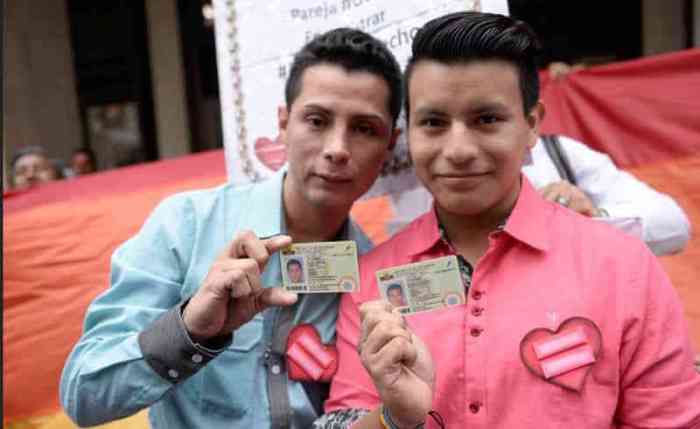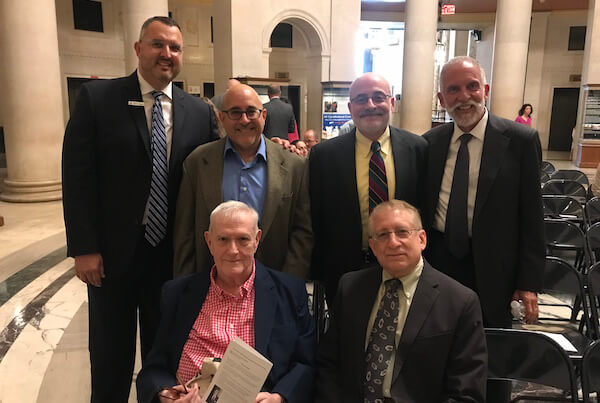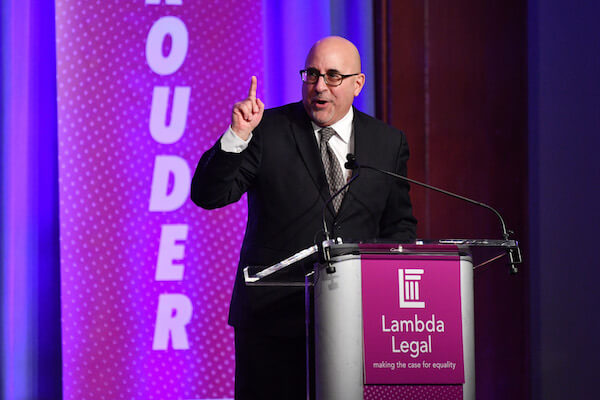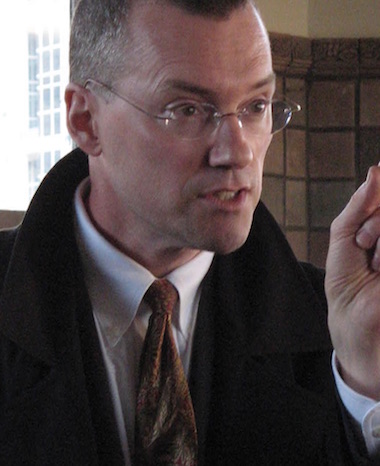Edie Windsor as seen in Donna Zaccaro's “To A More Perfect Union: United States v. Windsor.” | PHOTO BY, COURTESY OF DONNA ACETO
Donna Zaccaro accomplishes a whole lot in just 62 minutes. Her new film, “To A More Perfect Union: United States v. Windsor” — which screens in the coming week as part of the Winter Film Awards 2018 International Film Festival — not only tells the personal story of the remarkable woman who triumphed over the Defense of Marriage Act, and the legal strategy behind that victory, but also deftly encapsulates key threads from the past half-century of LGBTQ history in the process.
As Roberta Kaplan, the attorney who, working pro bono from a major Manhattan law firm, took on Edie Windsor’s challenge to a large federal tax liability on the estate of her late spouse Thea Spyer, says at the film’s outset, “Edie and Thea, their lives really tell a story about the history of gay people in this country through the 20th century.”
The telling of that story is advanced by informed commentary from the likes of Lillian Faderman, a leading scholar on LGBTQ history, and Evan Wolfson, who first at Lambda Legal and later as founder of Freedom to Marry, was essentially the godfather of marriage equality in the US and now worldwide. Top-flight legal observers, including Jeffrey Toobin from CNN and Nina Totenberg of National Public Radio, also lend their insights.
The real stars of the film, however, are Windsor herself as well as Kaplan and Kaplan’s wife, Rachel Lavine, who offer touching testimony about how lack of legal recognition of that couple’s marriage affected events immediately surrounding the birth of their son Jacob in 2006.
Windsor, who died this past September at 88, is captured in all her trademark utter candor, talking about her confusion in marrying her big brother’s best friend, only to figure out her mistake within a year; her early courting of Spyer, when “I was crazy about her but she was not crazy about me”; and her fear of wearing an engagement ring to her job as a mathematician at IBM in the late 1960s, knowing everyone would ask, “Who is he?”
“It used to be scary to be a lesbian,” she tells Zaccaro.
Documentary filmmaker Donna Zaccaro places DOMA’s demise in the context of a half-century’s progress
Kaplan, too, is frank about her fear of coming out 25 years ago, having no interest as a brilliant young lawyer in having “a life on the margins.”
“I was no revolutionary,” she says.
Kaplan relates, almost as though she remains exasperated to this day, the difficulty of keeping Windsor from exulting in her sex life with her late spouse Spyer as she met the press at various stages of the litigation.
“I don't want the Supreme Court justices or Americans having an image in their heads of you and Thea having sex,” she recalls emphasizing to Windsor. “I frankly don't want them having an image of anyone having sex.”
The interviews with Kaplan also hint at her skill as a quick-witted and articulate litigator able to parry the intense questioning involved in a Supreme Court argument, taking viewers into the deep weeds of her legal thinking in highly accessible fashion — her admiration for Justice Ruth Bader Ginsburg’s description of the “skim milk marriages” offered by civil unions and Justice Elena Kagan’s cross-examination of opposing attorney Paul Clement regarding DOMA’s 1996 passage, and her own pivot during the argument from a discussion of “moral disapproval,” a constitutionally impermissible grounds for enacting DOMA, to Americans’ changing “moral understanding” of the rights and dignity of gay- and lesbian-headed families.
In comments from Kaplan and Lavine, herself a longtime lesbian activist involved in city and state Democratic politics, Zaccaro’s film takes the issue from the tax inequities that Windsor faced to the insult to the dignity of lesbian parents visited on Kaplan when a nurse stopped her from taking Jacob, whose birth mother was Lavine, out the door of the hospital.
Zaccaro, a former “Today Show” producer who also made a documentary about her late mother, Geraldine Ferraro, draws on an impressive range of archival documentary footage and photography (including work by Gay City News’ Donna Aceto) to explain the arc of LGBTQ legal and social progress since the late 1960s.
Such a long time horizon, of course, necessitates a certain degree of glossing over at points; the handling of the AIDS crisis largely in terms of its catalyzing a sense of solidarity and the need for everyone to come out will no doubt leave some activists who spent decades fighting the epidemic a bit cold.
There were also moments where tougher questioning was called for. Richard Socarides, an advisor to President Bill Clinton when he signed DOMA, talks with wonderment about how that could have happened, without acknowledging his role in creating talking points for the president on the issue or specifying which “political advisors” felt the Republicans had successfully boxed him into a corner during a reelection year. Faderman, an excellent historian, unfortunately repeats a common misconception about what the US Constitution’s Full Faith and Credit Clause does and does not have to do with the question of marriage equality.
Rosie O’Donnell appears at several points in the film, presumably to add the celebrity power that is often conflated with “relatability,” but Windsor’s story and the parallel story of Kaplan and Lavine’s family are far more instructive and inspiring than the comedian’s observations.
These reservations aside, Zaccaro made very effective use of limited screen time to relay a vivid and triumphant tale, the details of which many of us witnessed first-hand but have not before seen so cogently wrapped into an effective history lesson.
TO A MORE PERFECT UNION: UNITED STATES V. WINDSOR | Anthology Film Archives, 32 Second Ave. at Second St. | Feb. 25 at 3:30 p.m. | $10 at winterfilmawards.com/wfa2018/tickets | Feb. 27 screening at Cinema Village is showing as sold-out



































